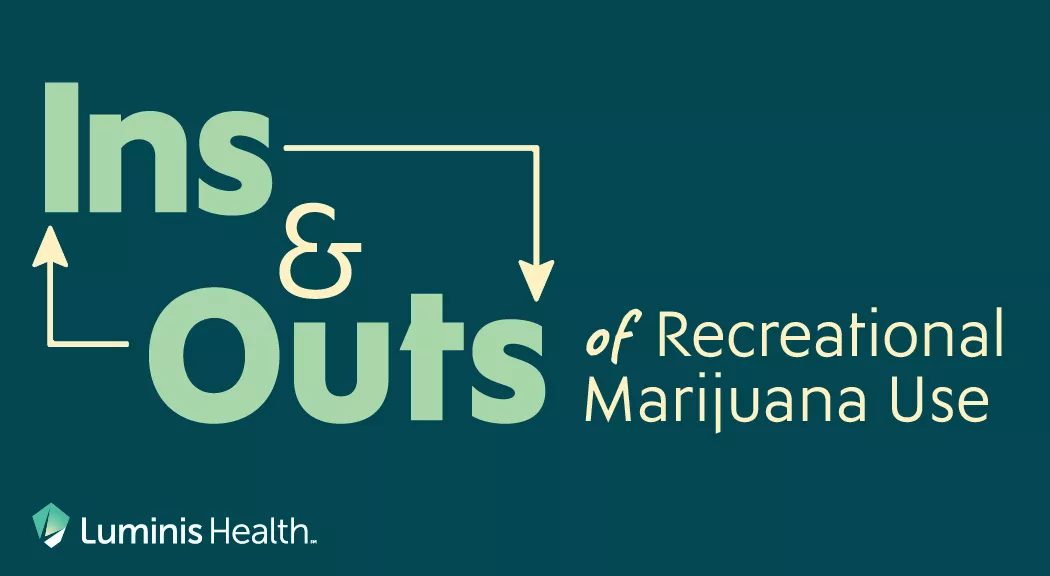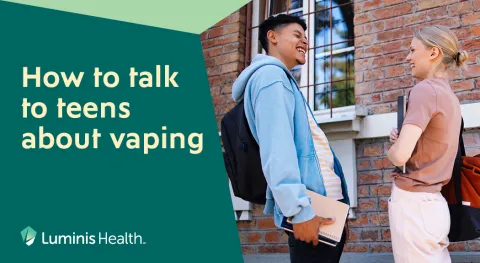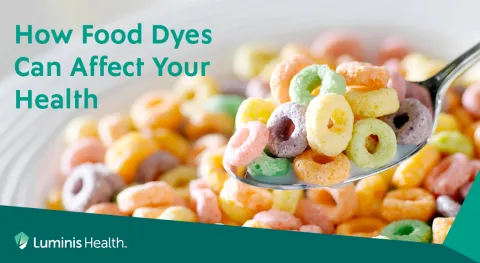Effective January 20, 2026, masks are encouraged for all staff, patients and visitors at all Luminis Health locations and will remain encouraged through the end of the influenza season. Thank you for your patience as we continue to care for our community.

It’s officially law. After approval from voters, Maryland becomes the latest state to allow the adult use of recreational marijuana. Starting July 1, 2023 anyone in Maryland aged 21 and older can legally purchase marijuana—also known as cannabis—for recreational use from licensed medical cannabis dispensaries. Before visiting one, it’s important to know the facts, especially the possible impacts of marijuana use.
Unregulated Potency
First, read the label. Because the potency of legal marijuana is not yet regulated, you must read a product’s label to know how much tetrahydrocannabinol (THC) is in a marijuana product. THC is one of the main substances—called cannabinoids—in marijuana that makes people feel “high.” By law, marijuana product labels must list the concentration of cannabinoid compounds they contain. The higher the percentage of cannabinoids, the more potent the product is and the stronger its effects.
You may be surprised to hear the concentration or strength of THC in marijuana products is increasing. A study of marijuana samples from 1995 to 2014 found that its potency had almost tripled. This is important to know, as the more potent a drug is, the more likely a person is to develop a substance use disorder from it.
Responsible Use
If someone aged 21 or older uses recreational marijuana, it is important to buy only from licensed dispensaries. This helps avoid unknown contaminants that can be dangerous or life-threatening, especially fentanyl. These factors are also crucial:
- Don’t drive while under the influence of any substance, including marijuana. It’s unsafe and illegal.
- Don’t combine cannabis with other drugs, including alcohol. The effects may be unpredictable.
- Inform your doctor about your marijuana use so they can tell you about any possible interactions with your prescribed medications.
- Keep marijuana out of the reach of anyone under the age of 21.
- Don’t use marijuana if your job doesn’t allow it or if you are on-call for a job, caring for someone who is sick or taking care of children.
- Don’t use marijuana while pregnant or nursing.
Potential Risks
Marijuana use—especially if it is frequent and in high doses—can sometimes cause people to be disoriented and have unpleasant thoughts or feelings of anxiety and paranoia. People who use marijuana are more likely to develop temporary psychosis, which means they don’t know what is real, hallucinate and can be paranoid, in addition to other symptoms.
Marijuana users are also more likely to develop long-lasting mental disorders, including schizophrenia (a type of mental illness where people might have delusions and hallucinations, among other things). A just released study from the National Institutes of Health reveals young men are at highest risk of schizophrenia linked with cannabis addiction.
Smoked marijuana can harm lung tissue and cause scarring and damage to small blood vessels, regardless of how it is smoked. Cannabis smoke has many of the same toxins, irritants and cancer-causing chemicals as tobacco smoke.
Adolescent Use
The human brain stops developing at around age 25. Use of cannabis by adolescents and young adults may cause harm to the growing brain, including serious problems with learning and feelings.
Cannabis Use Disorder
You also run the risk of developing marijuana use disorder, which means you are unable to stop using marijuana even though it’s causing health and relationship problems. Signs of marijuana addiction include:
- Using more marijuana than intended
- Trying but failing to quit using marijuana
- Giving up important activities with friends and family in favor of using marijuana
- Using marijuana in high-risk situations, such as while driving
- Continuing to use marijuana despite physical or psychological problems
- Needing to use more marijuana to get the same high
- Experiencing withdrawal symptoms when stopping marijuana use
You should refrain from using marijuana recreationally if you already have a diagnosed mental health condition or are in recovery from a substance use disorder, as the risk increases for developing cannabis use disorder or returning to the substance you were previously addicted to.
In Conclusion
Remember, just because it will be legal for those over the age of 21 to use recreational marijuana does not mean that it’s always safe. Do it in moderation, avoid daily use or large amounts.
Treat marijuana use the same way that you treat alcohol use—if you would not drink in certain situations, you also should not smoke or consume cannabis in similar situations. If you are using marijuana for the first time, start at lower potencies and increase slowly until you know how it will affect you.
And it bears repeating: Purchase your marijuana legally, so you know exactly what you are consuming and eliminate the risk of accidental overdose by exposure to fentanyl.



